- Home
- Anthony Burgess
A Long Trip to Teatime Page 3
A Long Trip to Teatime Read online
Page 3
‘I want to get back to school and then home to tea,’ Edgar said, looking for somewhere to sit down but finding only maps and globes, also still feeling very thirsty. Tea tea tea, he kept thinking. A nice cup of tea with milk and sugar. And some sweet biscuits. And a few buns. And thin bread and butter. And a pot of cherry jam.
‘I should imagine you must be, so to speak, very thirsty. Perhaps very hungry also, so to express it,’ said Mr Eden.
‘I’d give anything, sir,’ Edgar said. ‘I’d even give more than anything’ (thinking of the snake, Miss Lilith) ‘for a nice cup of tea.’
‘Tea?’ almost screamed Mr Eden. ‘Oh, you can’t have tea. Far too expensive. Why, there can’t be more than a half-ounce in the whole country, so to put it, and I should imagine that Her Majesty the Queen, may she live for ever, so to speak, has gotten hold of it. Eats it she does, mixed with a little salt, so to express it, and nobody is allowed to tell her that that’s not the way.’ He shook his head sadly and humorously and then let out a great shout, swivelling round to a square-shaped hole in the wall, about the size of a rather small picture. ‘Maria!’ he yelled. ‘Maria, Maria, to express it briefly and sharply and punctiliously!’ Then he winked at Edgar.
‘Yes, sorr, yer honour,’ came a little voice from the hole. ‘What is it you’d be wanting at all at all, and me in the middle of me castle rackrent?’
‘Fancies herself, you know, so to speak,’ said Mr Eden. ‘Been to America as a pioneer, as she termed it, and met up with Edgar Huntly.’ He looked very closely at Edgar and said: ‘You’re not the gentleman by any chance now, are you? No, no, you’re too young, so to express it, and you haven’t pion ears. Well, it stands to reason she couldn’t have been where she says she’s been – California and the Wild West and so on – because those aren’t marked on the map yet. See, so to speak.’ And, indeed, beyond a bit of the north-east coast, there wasn’t much of America on any of his maps.
‘Maria!’ called Mr Eden again. ‘Fetch something to eat and drink for this young gentleman here, so to speak.’
‘Oh sorr,’ returned the voice, ‘I’m right in the middle of me Frank and me Harry and Lucy. But I’ll come right enough and I’ll bring what’s fitting to be brought for the likes of him, whoever he happens to be, bless us and save us.’
‘Good, so to utter it,’ called Mr Eden. ‘Now then, I think your best way home, which, so to word it accurately, is your immediate and ultimate concern, is to go by way of Newfoundland and the West Indies. Yes yes yes.’ And, totally absorbed, he began to measure distances on a big globe with a dusty pair of protactors. While he was doing this a very large mouse came out of the hole in the wall, saying:
‘Ah sorr, the pity of it, but there’s nothing in the house at all at all but maps and globes, which is well and good for a nibble for the likes of us, sorr, but not what would be giving the nourishment as a young spalpeen like himself now would be requiring at all at all.’ The mouse had very busy whiskers and a little skirt on.
‘Oh well then,’ Mr Eden said, ‘I can’t oblige you so to speak except with a song, but perhaps a song will cure the thirst, so to put it, and Maria here will join in the chorus.’
‘But I’m in the middle of me moral tales and me belindas, sorr,’ said the mouse, in a voice that was not at all squeaky.
‘You do as I say, Maria,’ said Mr Eden in a gruff voice, ‘and don’t be giving yourself airs, so to speak, about your pioneering days in places that don’t exist yet.’ And then under his breath he muttered: ‘Edgar Huntly, indeed, so to speak.’ Then he raised his voice, which was already very high and wavery, and sang this song:
‘You can drink the waters of all of the seas
If you take out the saltiness first,
For salt’s very good with a piece of cheese
Or to season celery, beans and peas,
And anything else that your palate may please,
But it will not slake your thirst.’
There was a silence then, and Mr Eden said: ‘Come on, Maria, join in the chorus,’ but the mouse said:
‘Ah, sure now, sorr, me heart gets near to breaking when I think of cheese.’
‘Never mind about the cheese. The chorus, Maria, so to speak.’
Then they both sang:
‘Salt is nice to melt the ice
But it will not melt your thirst.’
Mr Eden sang again solo:
‘I have drunk of the waters of all the seas,
Till my stomach was fit to burst.
I’ve been to the north where the oceans freeze
And the south where the porpoise sits at his ease
And the east where the spice-trees bless the breeze,
But I’ve always found (and believe me, please)
That it will not slake your thirst.’
Then the chorus, while Edgar grew thirstier and thirstier:
‘Salt is the thing of which I sing,
And it will not cure your thirst.’
Both Mr Eden and the mouse Maria seemed to expect applause, so Edgar gave it to them. Whereupon Mr Eden bowed in a very old-fashioned way and said: ‘I think Edenborough is the place for him, don’t you, Maria?’
Edgar who was now down on the road, said to a very small soldier, who was coughing bitterly with the dust that was being raised: ‘What’s he done then?’ ‘Moi,’ said the soldier, ‘je ne parle pas français.’
‘Oh sure now, sorr, and ye took the words straight out of me mouth. That’s the place for him now, to be sure it is, don’t be talking.’
‘And how do I get there, sir?’ asked Edgar.
Mr Eden seemed rather embarrassed at that. He said: ‘Well, I’ve not been there myself, of course, so to express myself, not having the time with all the work here, so to speak, and to tell you the truth I can’t find it on any of the maps. But Maria here says it exists, so to put it.’
‘Oh sure, sorr, it does, and ‘tis as foine a place as ever stood upon two legs.’
‘Four legs you said, so to speak,’ frowned Mr Eden.
‘Two and four – sure they’re the same thing,’ said Maria.
‘Ah, no, they’re not, as I’ve repeatedly told you, so to say,’ said Mr Eden, growing darker.
‘Well now, sorr, that all depends which way you look at it.’
‘Oh no, it doesn’t, if I may so express it.’
‘You’ll forgive the observation, sorr, but it does.’
Edgar could see that a boring argument was about to begin, so he took his leave, bowing politely first to both man and mouse and saying ‘I am very grateful for all your help’ – words which were ignored. Mr Eden and his maid were now throwing dusty maps at each other, and Maria, despite her comparative smallness, was doing very well. The room was full of dust.
Edgar climbed down the hill and saw, in a cloud of outdoor dust this time, a man on a horse in fine armour, a kingly crown on his head, leading a little army that was coughing with the dust. ‘Avant, mes amis,’ cried the man on horseback, whom Edgar took to be a French king. ‘Moi, Henry the Fourth of France, am going to fight lui, Louis the Fourteenth of France. How dare he do what he’s done. Avant, a la victoire.’ Edgar, who was now down on the road, said to a very small soldier, who was coughing bitterly with the dust that was being raised:
‘What’s he done then?’
‘Moi,’ said the soldier, ‘je ne parle pas français.’
‘But it was English I spoke,’ Edgar said.
‘Oh, so it was,’ laugh-coughed the little soldier. ‘I get so mixed up these days, what with fighting for the Germans one day and the Belgians the next, and the Spaniards, as it might be, over the week-end, that I don’t know where I am. What was it you said?’
‘What’s the war all about?’
‘Ich verstehe kein deutsch.’
‘But it was English I was speaking.’
‘So it was, so it was. Well, it doesn’t do to know what a war’s all about, for you might not be inclined to fight it, and if you
don’t fight wars, where’s your bread and butter going to come from, eh? Not to mention a nice pint mug full of very milky tea with sugar in it.’
‘I’d give anything for that,’ said Edgar.
‘I’m sure you would,’ said the soldier, ‘but where we’re going it will most likely be wine.’
‘Stop talking in the ranks there!’ A sergeant with a great bristling moustache, his uniform all covered in dust, began pushing at the small soldier and then pushing at Edgar. ‘You, boy, where’s your drum? You should be out at the front there, just a few paces ahead of His Sacred Majesty’s steed, beating away for dear life and keeping the men in step.’
‘But I’m not in your army,’ Edgar said. ‘And I’ll thank you not to push at me like that.’
‘Shall I push you some other way, then?’ barked the sergeant. ‘Because I can, boy, oh yes, I can. Go on, then – out of it, if you’ve no stomach for fighting a just war. Sing,’ he then cried. ‘Sing, you underbred lumps of bone-idolatry, and keep your cowardly hearts up.’ At once all the soldiers began to sing, His Sacred Majesty included, though some coughed too much with the dust to make a really musical effort of it all:
‘Liberty of conscience,
That’s we require:
No banging us with truncheons
And roasting on the fire.
We’ll go to church when we wish
Or not, if we desire,
And Friday’s not for fish
But steak fried on the fire.’
Edgar watched them march out of sight in a vast cloud of dust, and he himself took the road in the opposite direction, for he felt sure that they could not be marching to Edenborough. Edenborough, he was sure, was not ruled over by King Louis the Fourteenth of France. He was fairly sure, anyway.
CHAPTER III
The Road
to Edenborough
IT WAS a long long walk to Edenborough and Edgar saw very little to admire on the way. On one side were fields with cows in them, and on the other was a stream, parallel to the road, which was full of jumping fish. The cows had been taught to sing. Edgar wondered who had bothered to waste so much time in teaching them, especially as their songs were not very melodious. Their chief song was one that is called My country ’tis of thee if you are American and God save the Queen (or King), if there happens to be a king on the throne – where we have, as I tell Edgar’s story, a Queen – God bless her – radiant in beauty and brilliant in brain: Her Majesty – God bless her and save her – Edith the First, with – may she live for ever – a neck so long and white – heaven preserve it – that she is called sometimes – in total and seemly and loyal reverence – Edith Swan Neck) if you happen to be British. The cows could not, of course, manage the words of either version, but they dealt with the tune by each taking one note only. So one cow would bellow the first note, then repeat it (the first and second notes being the same), then there would be a long pause while another cow slowly came to the realisation that it was its turn to sing, and then it would bellow out the third note. It would thus take about three minutes to cover ‘My coun tree’ (or ‘God save our’), and this made the whole procedure very boring. But it gave the cows something to do besides munch grass and make milk, so perhaps it was not all really a waste of time. They had, apparently, another song, much more difficult, and this was Pop goes the weasel. They made it sound like a funeral march for marchers without legs.
The fish in the stream on Edgar’s right were much more lively. They were jumping for flies, all of which they knew by name, but they never succeeded in catching any. They were quite cheerful about it, and Edgar heard them chirping: ‘There goes Frank Jeffrey – missed him again’ and ‘Harry Brougham always gives me the slip’ and ‘Sid Smith is too quick for me, bless him.’ One old fish, whose jumping was rather painful and awkward, as though he had fishy rheumatics, kept grumbling: ‘Bring the constable to them. Bash them with a truncheon,’ but none of the other fishes took any notice. They were very pretty fish, silvery with gold-spotted heads, and some of them greeted Edgar with courtesy: ‘Travelling with legs, I see, on dry land too. Get wise, my boy, to the truth of the matter. It’s all in the water.’ Edgar waved to them, smiling with a very dry mouth, but soon forgot them, and the cows too, when he came to a little stall by the side of the road which seemed to have bottled drinks for sale.
This stall, which was protected from the sun by a huge rainbow umbrella, had a flag flying from it which announced: ‘SLAKE YOUR ARID THROTTLE WITH EDWIN’S BRISK AND BUBBLING BEVERAGES’. When Edgar came up to it, he found the drink-seller himself laid out at length on the counter of his stall, snoring away. He was, Edgar saw with interest, a large spotted dog with trousers of hideous cut, whose long snout twitched irritably in his sleep. Edgar took advantage of this unconsciousness not (heaven forbid!) to steal but to examine. None of the bottled drinks, which were very cold to the touch despite the hot sun and the lack of ice, were familiar to him. Bishopberry crush, absentee ale, rossettiade, jimandjack juice – he had never met any of them before. He was handling a delightfully chill bottle of Sir Walter Scott’s Ineffable And In No Wise To Be Imitated Scotch Soda when he heard a growl: ‘Caught you at it, have I, grrrrr?’
When Edgar came up to it, he found the drink-seller himself laid out at length on the counter of his stall, snoring away. He was, Edgar saw with interest, a large spotted dog with trousers of hideous cut, whose long snout twitched irritably in his sleep.
‘I wasn’t stealing, I was looking,’ said Edgar. The dog still lay there, frowning and growling, presumably believing that the growl would be enough to frighten Edgar off. ‘I’d like to drink something if I may. I’m terribly thirsty.’
‘How much money have you got, grrrrr?’
Edgar took out his tiny coin, which he had difficulty in sorting out from the indiarubber and bits of chalk and string and breadcrumbs and ant’s eggs in his pocket. ‘This,’ he said at last. ‘One vathek.’
The dog let out a loud laughgrowl: ‘Hahahagrrrrrrhahagrrrrrahaha. That won’t take you very far with me, His Majesty King Edwin, grrrrr. In Northumberland, where I come from, we make very short work grrrrr of folk armed with grrrrr vatheks. So put it down on the counter near my left back paw grrrrr and help yourself to a tiny bottle of Edom O’Gordon’s danishberry jumpjuice grrrrr. It has a face on the grrrrr label.’ Edgar did as he was told with the coin and then searched for the bottle in question. He had great difficulty in finding it but, at last, from among the shining phalanx of strange drinks, a voice came saying: ‘Looking for me, is that it?’ Edgar put out his hand, squinting for the source of the voice, while the voice said: ‘You’re hot, you’re hot, now you’re cold, now you’re very cold, now you’re freezing, now you’re among the Eskimos, now you’re on the North Pole, ah, better, better, ah, now you’re on the equator, got me, got me, ah.’
The bottle was indeed a tiny one, and Edgar could hardly see the face on the label, which seemed to be of a jolly man with a black beard – much much smaller than the head of Queen Edith (God bless her) on a doll’s house postage stamp. But the voice was fruity and clear. ‘Get me down, boy. Go on. Do you the world of good, or bad, depending on how you are.’ It seemed a very little portion of drink to cure a thirst, and Edgar did not like the use of the word bad. Nevertheless he pulled out the tiny cork between his teeth and promptly swallowed it (it was much too tiny to make him choke). Then he sucked in the tiny drop of drink. It was hard to say what it tasted like but it was as if very very cold ice had been flavoured with currants, raisins, candied peel, chocolate, vanilla, nutmeg and a cut off an over-roasted joint of roast pork. At once Edgar felt a great deal less thirsty. The face on the label became still and silent, but the dog who called himself King Edwin of Northumberland and who had been watching all this time and growling gently to himself, suddenly let out a great bark.
‘What’s that for?’ asked Edgar. ‘Did I do something wrong?’
‘Bow wow wow,’ or something like it, went King Edwin. ‘
I said you were to help yourself to it, not to drink it.’
‘But it means the same thing. If you ask somebody to help himself to a slice of cake, it means eat it. Besides, you didn’t tell me to stop when I started drinking.’
‘That, bow bow, was to see the badness of you to the limit, which I knew was there. We’d make short work of you in Northumberland, I can tell you. Well now, helping yourself to a piece of cake means eating it, not drinking it. And you drank that stuff up, bow wow, grrrrr.’
‘Wrong,’ Edgar protested, ‘Helping yourself to a book from a shelf doesn’t mean eating it, either.’
‘How do you know, boy, bow wow? In Northumberland where I was a king, they used to devour books. I know, because I devoured many myself, grrrrr. But all this is not the point.’
‘You mean,’ said Edgar, growing annoyed, ‘I should have eaten that bottle, not drunk it? But that’s ridiculous.’
‘I’ll tell you what’s ridiculous and what isn’t, me being grrrrr King Edwin. Now do what I say, boy, bow grrrrr wow.’
‘You mean eat the bottle?’ shouted Edgar.
‘No no no no no, bow wow wow grrrrr. Read it.’
Edgar shrugged: this was certainly a mad dog. He was just going to say that there was nothing to read on the label except a tiny blackbearded face, but he saw that there was no point in arguing with a mad dog who thought he was King Edwin of Northumberland. So he looked down at the label and, not really to his surprise, found a poem there – written in beautifully clear handwriting and very easy to read. He read it aloud, and the dog gave a kind of purring growl, as though he had cats in his ancestry, which seemed to show that he liked to be read aloud to:
‘Thomas Alva Edison,

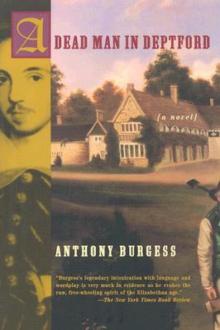 A Dead Man in Deptford
A Dead Man in Deptford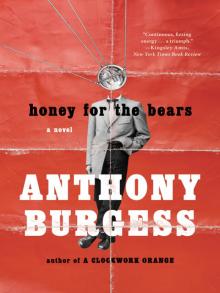 Honey for the Bears
Honey for the Bears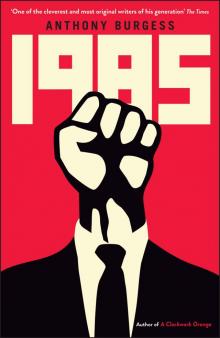 1985
1985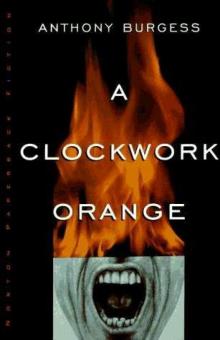 A Clockwork Orange
A Clockwork Orange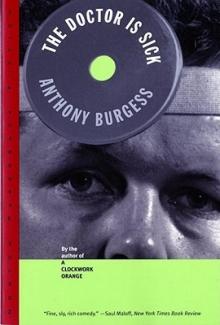 The Doctor Is Sick
The Doctor Is Sick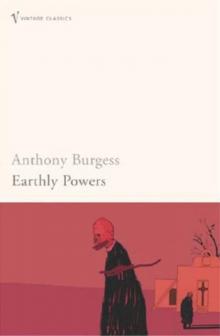 Earthly Powers
Earthly Powers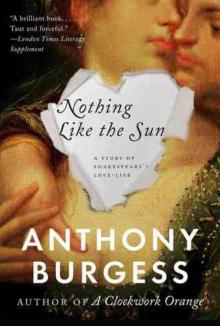 Nothing Like the Sun
Nothing Like the Sun Collected Poems
Collected Poems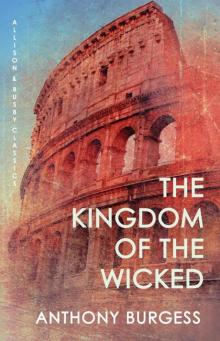 The Kingdom of the Wicked
The Kingdom of the Wicked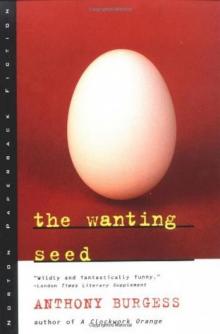 The Wanting Seed
The Wanting Seed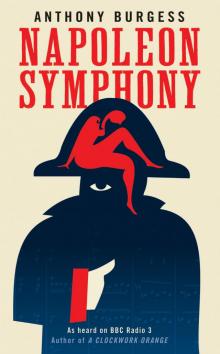 Napoleon Symphony
Napoleon Symphony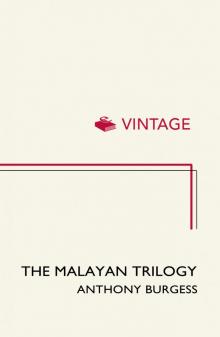 The Malayan Trilogy
The Malayan Trilogy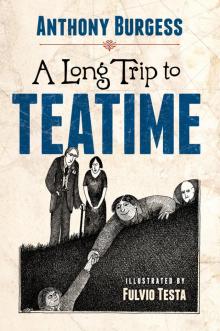 A Long Trip to Teatime
A Long Trip to Teatime Enderby Outside
Enderby Outside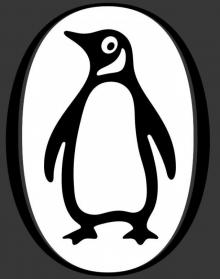 M/F
M/F The Complete Enderby
The Complete Enderby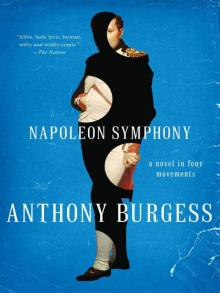 Napoleon Symphony: A Novel in Four Movements
Napoleon Symphony: A Novel in Four Movements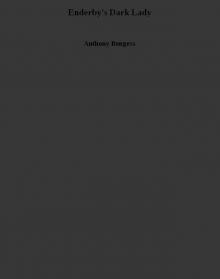 Enderby's Dark Lady
Enderby's Dark Lady The Clockwork Testament (Or: Enderby 's End)
The Clockwork Testament (Or: Enderby 's End) ABBA ABBA
ABBA ABBA A Clockwork Orange (UK Version)
A Clockwork Orange (UK Version)